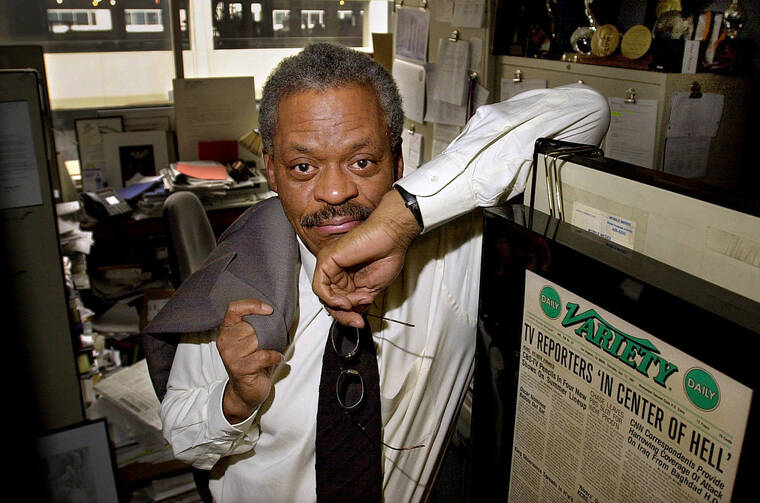Bernard Shaw, CNN’s first anchorman, dies at 82
NEW YORK >> Bernard Shaw, a former CNN anchor and pioneering black journalist remembered for his outspoken question in a presidential debate and who calmly reported from Baghdad as the Gulf War began in 1991 when it was under attack, has died. He was 82.
He died Wednesday in a Washington hospital of unrelated COVID-19 pneumonia, according to Tom Johnson, the former CEO of CNN.
Shaw, a former CBS and ABC journalist, jumped at the chance and accepted an offer to be the anchorman at CNN’s launch in 1980. He later reported on the 1981 assassination attempt on President Ronald Regan in front of a camera hastily set up in a newsroom.
He retired in 2001 at the age of 61.
As moderator of a 1988 presidential debate between George HW Bush and Michael Dukakis, he asked the Democrat — an opponent of the death penalty — if he would support that punishment for someone found guilty of raping and murdering Dukakis’ wife, Kitty.
Dukakis’ cool technocratic response was widely seen as damaging to his campaign, and Shaw later said he received a barrage of hate mail for asking about it.
“Since when does a question hurt a politician?” Shaw said in an interview aired by CSPAN in 2001. “That was not the question. That was the answer.”
Shaw was memorably reporting from a Baghdad hotel room, along with correspondents Peter Arnett and John Holliman, as CNN aired stunning footage of airstrikes and anti-aircraft fire at the start of the US invasion to liberate Kuwait.
“I’ve never been there,” he said that night, “but it feels like we’re in the middle of hell.”
The reports were crucial to the creation of CNN when it was the only cable news network and networks ABC, CBS, and NBC dominated television news. “He popularized CNN,” said Frank Sesno, former head of CNN’s Washington bureau and now a professor at George Washington University.
Growing up in Chicago, Shaw wanted to be a journalist and admired legendary CBS journalists Edward R. Murrow and Walter Cronkite, recognizing this as a pivotal moment.
“For all those years preparing to be an anchor, one of the things I aspired to was being able to control my emotions in the midst of all hell erupting,” Shaw said in a 2014 interview with NPR. “And I personally feel like I passed my rigorous test for that in Baghdad.”
Shaw covered the 1989 Tiananmen Square riot in China and resigned when authorities asked CNN to stop its television show. While at ABC, he was one of the first reporters to the scene of the 1978 Jonestown massacre.
Taking to Twitter, CNN’s John King paid tribute to Shaw’s “soft-spoken but booming voice” and said he is a mentor and role model to many.
“Bernard Shaw exemplified excellence in his life,” Johnson said. “He will be remembered as a staunch advocate of responsible journalism.”
Current CNN executive Chris Licht credited Shaw as a CNN original who appeared on the network to comment just last year.
Armed enough to avoid any semblance of bias that he didn’t vote, Shaw put tough questions to several politicians. He asked Dan Quayle, George HW Bush’s vice presidential pick, if “fear of being killed in Vietnam” led Quayle to join the National Guard in 1969.
In 1961, while a member of the US Marines, Shaw sought out a meeting with one of his heroes, Cronkite, in Hawaii.
“He was the most persistent guy I’ve ever met in my life,” the late Cronkite told The Washington Post in 1991. He was just determined to be a journalist.”
He got a radio job in Chicago, where an early assignment covered a performance by Martin Luther King. Shaw recalled to CNN King, telling him, “One day you’re going to make it. Just do something good.”
By retiring at a relatively young age, Shaw acknowledged the strain on his personal life that came with being a successful journalist. Because of all the things he missed doing with his family while at work, he told NPR, “I don’t think it was worth it.”
His funeral will be private, with a public memorial planned for later, Johnson said. He is survived by his wife Linda and two children.


Comments are closed.